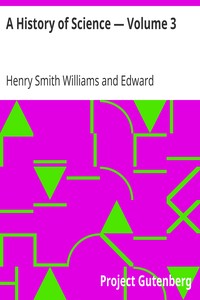A History of Science — Volume 3 by Williams and Williams
"A History of Science — Volume 3" by Williams and Williams is a scientific publication written during the late 19th century. This volume delves into the modern development of the physical sciences, particularly astronomy, paleontology, geology, meteorology, and their historical significance in shaping our understanding of the natural world. The content covers key figures and concepts that emerged in these fields between the late 17th century and the early 19th century, highlighting
advancements that contributed to a more comprehensive view of the universe. The opening of this volume introduces the reader to the transition into modern science, emphasizing the rapid progress made in the 19th century across various disciplines. It begins with a discussion of notable astronomers such as Johannes Hevelius, Edmond Halley, and William Herschel, detailing their contributions to the understanding of celestial bodies, including the discovery of Uranus and advancements in the study of stars and planets. This portion sets the stage for exploring the evolution of fundamental concepts like the conservation of energy, the shape of the Earth, and the nature of comets and meteors, all of which lay the groundwork for modern scientific inquiry. It illustrates how insights gained during this period reshaped perspectives on the universe and humanity's place within it. (This is an automatically generated summary.)
Read now or download (free!)
| Choose how to read this book | Url | Size | ||||
|---|---|---|---|---|---|---|
| Read online (web) | https://sendtokindle.compellingsciencefiction.com/ebooks/1707.html.images | 591 kB | ||||
| EPUB3 (E-readers incl. Send-to-Kindle) | https://sendtokindle.compellingsciencefiction.com/ebooks/1707.epub3.images | 288 kB |
Send
to kindle email: |
|||
| EPUB (older E-readers) | https://sendtokindle.compellingsciencefiction.com/ebooks/1707.epub.images | 294 kB | ||||
| EPUB (no images, older E-readers) | https://sendtokindle.compellingsciencefiction.com/ebooks/1707.epub.noimages | 273 kB | ||||
| Kindle | https://sendtokindle.compellingsciencefiction.com/ebooks/1707.kf8.images | 538 kB | ||||
| older Kindles | https://sendtokindle.compellingsciencefiction.com/ebooks/1707.kindle.images | 511 kB | ||||
| Plain Text UTF-8 | https://sendtokindle.compellingsciencefiction.com/ebooks/1707.txt.utf-8 | 517 kB | ||||
| Download HTML (zip) | https://www.gutenberg.org/cache/epub/1707/pg1707-h.zip | 284 kB | ||||
| There may be more files related to this item. | ||||||
About this eBook
| Author | Williams, Henry Smith, 1863-1943 |
|---|---|
| Author | Williams, Edward Huntington, 1868-1944 |
| Title | A History of Science — Volume 3 |
| Note | Reading ease score: 48.0 (College-level). Difficult to read. |
| Note | Volume 3: Modern development of the physical sciences |
| Credits | Produced by Charles Keller, and David Widger |
| Language | English |
| LoC Class | Q: Science |
| Subject | Science -- History |
| Category | Text |
| EBook-No. | 1707 |
| Release Date | Apr 1, 1999 |
| Most Recently Updated | Jan 29, 2013 |
| Copyright Status | Public domain in the USA. |
| Downloads | 182 downloads in the last 30 days. |
| Project Gutenberg eBooks are always free! | |

